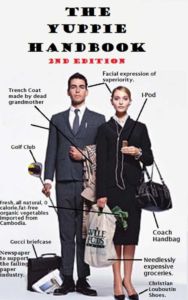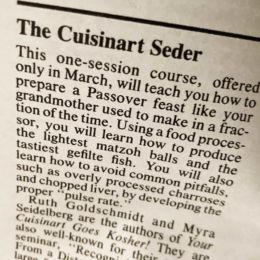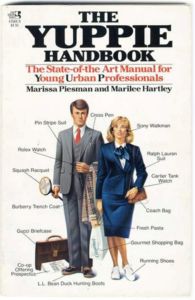The Yuppie Handbook‘s cover illustration is brimming with nostalgia. The tawdry insides are brimming with dreck.
Has it really been 40 years since The Yuppie Handbook? No, its copyright page says it came out January 1, 1984. But the book was so drenched in early-‘80s sensibility that it was already looking dated on its publication date.
Coming back to it today, one gets a pungent whiff of nostalgia and wonderment. Much of it is as bafflingly antique as that fondue kit you got for Christmas in 1979 (still new-in-box, is it?).
Look at the cover and see what I mean. The woman is wearing a boxy-shouldered suit with “Running Shoes.” When was the last time you heard the phrase “running shoes”?
In the early ‘80s, a young woman who wore a boxy “Ralph Lauren Suit” (Paul Stuart or a knockoff, surely?) and arrived at work in “running shoes” was sending out obvious class signals. There was a transit strike in New York City in early April 1980, and people who lived in Manhattan walked to work, often in clunky trainers. Those heavy Adidas and Sauconys became a badge of status, announcing to the world that you weren’t a bridge-and-tunnel loser! The style spread far and wide, lingering for years as a Yuppie marker, long after everyone had forgotten how the fad started.
We can’t laugh at the Sony Walkman; iPods and iPhones were for the distant future. Likewise, the “Fresh Pasta” from Balducci’s or wherever may seem naïve today as a class marker. But it reminds us there was a time, four or five decades back, when it seemed trés sophistiqué to know about “pasta,” as the cognoscenti had begun to call spaghetti and so on. If you were carrying a sack of fresh “pasta,” it suggested you’d gone to a distant neighborhood to buy it.

You can buy North American New Right vol. 2 here
And now I draw your special attention to the Squash Racquet, the basic Coach Bag, and the Burberry Trench Coat. Coach and Burberry were gilt-edged brands 40 years ago, but few people think of them that way now. They democratized too much, sold their goods in every shopping mall, started manufacturing in Red China. And the Burberry trademark-plaid famously tanked after it became the badge of lower-class “chavs” of southeast England, circa 2005.
The Squash Racquet needs a bit more explaining. The game of squash (or more properly, “squash racquets”) had a big vogue during 1979-1982. In New York, Boston, and Washington DC, new squash facilities sprang up like mushrooms. But then the craze suddenly crashed. It turned out most people didn’t want to play squash! If they needed to knock a little ball around a shoebox-shaped indoor court, they much preferred the prole version – racquetball — played with an ugly little short-handed paddle. Hemorrhaging cash, squash clubs accommodated them and changed their corporate brand.
The early-‘80s king of the squash hill, Town Squash, Inc., renamed itself Town Sports. It lives on today as a “leisure industry” conglomerate, mainly known for its value-priced commercial gyms, e.g., New York Sports Club, Boston Sports Club, Washington Sports Club, even a Philadelphia Sports Club — in basically any city where squash once flourished.
The Fake Sequel
 There was a second edition of The Yuppie Handbook (sort of), circa 2006. I don’t think it was a real book; it seems to have been a promotional item given out by a knitwear company. Here we see no squash impedimenta, or even a racquetball paddle. Instead we get a golf club. Bad choice! At this point, the annoying status symbol was a $3,500 triathlon bike.
There was a second edition of The Yuppie Handbook (sort of), circa 2006. I don’t think it was a real book; it seems to have been a promotional item given out by a knitwear company. Here we see no squash impedimenta, or even a racquetball paddle. Instead we get a golf club. Bad choice! At this point, the annoying status symbol was a $3,500 triathlon bike.
Gone too is the now-declassé Burberry. It’s been replaced with a plaid-lined “Trench Coat made by dead grandmother.” I suppose the point here is that a unique, handcrafted garment made in 1939 affords more status than a pricey brand. A reasonable point, but it confutes the idea that ostentatious consumerism was the prime marker of Yuppiedom.
Further along, the Coach Handbag is now an oversized “bowling bag” model of the sort that was popular around 2002, although neither it nor the Coach brand carried any cachet. Finally, instead of a Walkman, the lady carries an iPod Nano. Now, the original Sony Walkman was expensive for its day, and often hard to find, but by 2006, everyone had an iPod. No one ever thought of it as an accessory for upscale young “professionals.”
Truly, Yuppiedom faded out sometime in the 1990s, the era when corporate offices began to have Casual Friday dress codes, which soon and inevitably yielded to “Business Casual” slob culture year-round.
* * *
And now for the insides. The 1984 Yuppie Handbook was a bait-and-switch deal. The text of the book has little to do with the cover’s promise. It is coarse, tawdry, slapped-together, like something hashed out in a few days from some old cent-a-word porn-novel boiler room.
Even more than its model, The Official Preppy Handbook (1980), it has a noticeable Jewish slant. The chapter on “Organized Religion” consists mostly of jokey comparisons of how Orthodox and Reform Jews spend “the Sabbath.” There are no Catholics, Episcopalians, Presbyterians, or Lutherans within this eruv. Holy Communion for Yuppies means brioche and mimosas for brunch (yok yok yok).
 The book never rises above this Borscht Belt level of wisecrack. In a chapter called “Y.U.” (Yuppie University) we get spoof course offerings from The Learning Annex, including “The Cuisinart Seder.”
The book never rises above this Borscht Belt level of wisecrack. In a chapter called “Y.U.” (Yuppie University) we get spoof course offerings from The Learning Annex, including “The Cuisinart Seder.”
All this would seem to subvert the book’s advertised purpose. Going by the cover and blurb, the ideal Yuppie objective is to be a stylish member of the Anglo-Celtic haute bourgeoisie, the class celebrated in the fiction of John O’Hara, John P. Marquand, and Sloan Wilson. But that “Cuisinart Seder” clues us in to the authors’ frame of reference.
The Learning Annex, with its ubiquitous course catalogs distributed streetside in newspaper-style racks, was a new fixture of 1980s urban living. As with singles bars, no one regarded it as a Yuppie preserve. But there’s a subtext here. Its courses functioned as a cover for “networking” and hookups, and thus attracted a disproportionate number of Jews. Catalog offerings were heavily weighted toward self-help gurus and pop psychology. They were thus like a downmarket version of EST, with classes that cost $35 rather than $1,350.[1]
Seeking demographic balance, The Yuppie Handbook strives hard to be an equal-opportunity offender. We’re told about exotic subcategories, such as “Guppies” (Gay Yuppies) and “Buppies” (Black Yuppies). Guppies, the authors gush, “are really super Yuppies because they were the pioneers of Yuppie culture.” That is, (male) gays were into ostentatious consumerism and self-preening long before straight folk picked up the trend. Two incomes, no kids, right?
The “Buppies” section is a tooth-grinding read today. We’re told Buppies have “a tendency to name their daughters Keesha instead of Rebecca.” They have a “preference for custom-made suits” rather than “ethnic fashions like dashikis.” And you can spot Buppies because they can talk sort of like white people. Or, as the authors put it, they have “carefully articulated and accentless speech,” which is why “so many Buppies get jobs as newscasters.”
I’m sure we can all think of a couple better reasons.
“Prominent Buppies” supposedly include Bryant Gumbel and Arthur Ashe, though not of course the articulate, white-talking, luxuriantly afro’d Barack Hussein Obama, who’d just finished his two years at Columbia College in Morningside Heights.
Straining at gnats, the authors also conjure up “Juppies” (not what you think — they’re Japanese) and “Puppies,” that is, Pregnant Urban Professionals. The authors thought it might be amusing to mock thirtysomething female VPs running around the office (usually to the bathroom) in business-appropriate maternity wear. But they never really explore the idea, they just point and laugh (yok yok yok).
The only people left out of the Yuppie Diversity Tent are normal, everyday Heritage Americans.
* * *
The Yuppie Handbook was one of a number of little humor books that came out in the early 1980s, all pivoting around a theme of social-class markers. Some were better than others. It was an identifiable genre of the time. We had The Official Preppy Handbook (1980); the copycat and uninspired Sloane Ranger Handbook (1982) in England; Paul Fussell’s Class (1983), inspired by both the Preppy Handbook and Jilly Cooper’s earlier Class (1979) in England; and then such genre variants as whimsical parodies of L. L. Bean (Items from Our Catalog, More Items from Our Catalog) and The New Yorker.
The most witless of these by far is The Yuppie Handbook. Its authors and producers evidently sold-in the book proposal on the strength of title alone without bothering to find out what made those other books work, what made them stylish or amusing.
The Yuppie Handbook was never really more than a concept (“Let’s do a Preppy Handbook . . . but for Yuppies!”) and a cover illustration. The 8,000 words of drivel on the inside are just filler. Not a spark of wit, not a dram of insight. Usually you can judge a book by its cover, but not this time.
* * *
Counter-Currents has extended special privileges to those who donate $120 or more per year.
- First, donor comments will appear immediately instead of waiting in a moderation queue. (People who abuse this privilege will lose it.)
- Second, donors will have immediate access to all Counter-Currents posts. Non-donors will find that one post a day, five posts a week will be behind a “paywall” and will be available to the general public after 30 days.
To get full access to all content behind the paywall, sign up here:
Paywall Gift Subscriptions
 If you are already behind the paywall and want to share the benefits, Counter-Currents also offers paywall gift subscriptions. We need just five things from you:
If you are already behind the paywall and want to share the benefits, Counter-Currents also offers paywall gift subscriptions. We need just five things from you:
- your payment
- the recipient’s name
- the recipient’s email address
- your name
- your email address
To register, just fill out this form and we will walk you through the payment and registration process. There are a number of different payment options.
Note
[1] Erhard Seminars Training (EST) and its later edition, the Landmark Forum, were high-pressure self-assertiveness courses created by one “Werner Erhard,” alias John Paul Rosenberg. Ayn Rand’s onetime boytoy Nathaniel Branden held similar “Power of Self-Esteem” courses through The Learning Annex. A perennial Learning Annex offering was New Age blather from one “Marianne Williamson” (real name: Vishnevetsky), whose offerings had titles on the order of, “A Short Course in Miracles.”
Enjoyed this article?
Be the first to leave a tip in the jar!
Related
-
Are Whites Finally Waking Up?
-
Think about It, Michael Nehls’ The Indoctrinated Brain, Part 1
-
Looking for Anne and Finding Meyer, a Follow-Up
-
The Origins of Western Philosophy: Diogenes Laertius
-
Birch Watchers
-
Elizabeth Dilling on the Evil of the Talmud
-
Nowej Prawicy przeciw Starej Prawicy, Rozdział 5: Refleksje nad Pojęciem polityczności Carla Schmitta
-
Brian Moore’s Black Robe

13 comments
I have a love-hate relationship with Counter-Currents (which I read every day and am happy to support financially) because I often react to the truth-telling articles with a rise in my gorge. That does not feel good.
So I appreciate the articles which can tell the truth and not make me want to go postal. Like this one. Thanks!
Homo sapiens is a powerfully status-driven species. None of the equality-lovers I know are one whit less obsessed with it. At least the Yuppies were overt.
We need both, dont we? The ability to maintain good spirits and our sense of humor, dark though the subject matter may be, is one of the most important characteristics we should hold on to as we stare into the abyss. But the meat and potatoes that gets the blood up is what will compel true action. Funny memes alone wont get us across the finish line
Excellent article Margot. Jim Goad clearly has some competition nipping at his heels im the wry humor department.
“I’m sure we can all think of a couple better reasons”
Yes, we certainly can. Thanks for the chuckles!
I’m sorry there is no Twitter-style “like” button here! Thank you, all.
I wrote this a few months ago while feeling refractory about a similar but more serious treatment of Paul Fussell’s Class. That’s on its way…I hope.
Admittedly, I’m quite fond of The Official Preppy Handbook.
I no longer have my (now expensive) copy, but don’t recall the overt Jewishness. Probably because it did actually celebrate so many facets of WASPishness (and that I read it back before I’d become a raging antisemite).
Since I like it, I’ll bet this imposter you’ve described would really chafe. Preppy at least contains some decent clothing and reading references.
I had thought that a comparison between it and Birnbaum’s (?) follow-up woke collaboration called True Prep would be an interesting study, though the point (besides “Look at what inroads have been made by our enemies in just a few decades!”) eludes me.
This was a fun read!
Birnbach
Do consider such a comparison. I no longer have either, but I recall that my copy of True Prep was, like the reissue of the Yuppie handbook MM describes, a “promotional item,” a hardcover version gold-stamped by Brooks Bros. I found it for a buck at the Strand bookstore. Among other outrages, it adds Barak Obama to the Preppy Pantheon (or whatever it’s called), revealing its True SWPL-ness. To be fair, I think original author Lisa Birnbaum (yes, a Jewess) was just along to lend her name for the cash-in, and the new content was compiled by a couple of co-authors, rather in the “whatever” manner MM describes here.
A shame, as the original came along at about the time I got my first, real, office job, and provided many hints on how to transition from the plaid shirt and work pants of a poor graduate student to a bar association employee (there was a Brooks in the same building, fortunately). and later a guide to where to a decent drink suitable surroundings in Manhattan. As Fussell says in Class, it and Yuppie sell the idea of a buyable fantasy; you can’t really join the true upper class, or the international aristos, but you can buy the right clothes and toys to be “upper middle class.” (Fussell of course is grinding his own axe; his idea that the really cool kids belong in what he calls “Class X” is, as a reviewer in I think the (old) Atlantic pointed out, just another fantasy that college professors like himself are “the real” elite. Years before Curtis Yarvin!
I’ve always thought of Lisa Birnbaum as Paris Geller, here as she travels from Chilton Prep to Rory’s small town, in search of Deplorables, snarking a mile a minute while trying “blend in, fade away, observe”. Alas, Stars Hollow is true Yankee Prep, and Paris will never fit in, even though her parents can afford the fancy school and the uniforms (at least until the season when they’re imprisoned for some kind of typical financial fraud).
https://youtu.be/AltlTz9p4w4
I’m encouraged now; thank you for the nudge!
From the freezer to the counter to thaw, out come the cold ideas. Just ordered both books to peruse again and annotate.
***
I know nothing of Birnbach the person, but judging from parts of True Prep, your Paris Geller comparison sounds pretty darn apt.
I think the Yuppie Handbook was an instance of Jews with their noses pressed up against the window, particularly about things like squash. While it may be associated with limp-wristed Ivy League momma’s boys—the same who’re attracted to crew as an off-season alternative to “let’s hit the showers” after glee club—squash is one of the most difficult sports you’re likely to try. Same with serious cycling, whether on a tri or racing bike. Anyway, you’re not likely to see some Jewbaccas out riding known routes on a $5k tri bike, either, because they’re all posturing at Starbucks in expensive riding kit.
Having always thought of J. Crew as yuppie casual wear, I was not surprised to read an article a while back about the company’s massive down spiral; attributed to their hesitancy to adopt “urban” and “athletic” wear… which is now worn by all, modern yuppies included.
But it reminds us there was a time, four or five decades back, when it seemed trés sophistiqué to know about “pasta,” as the cognoscenti had begun to call spaghetti and so on. If you were carrying a sack of fresh “pasta,” it suggested you’d gone to a distant neighborhood to buy it.
I guess I’m too young to remember that, for which I’m grateful. How did one talk about pasta in general, as opposed to the long, cylindrical, twirlable noodles known as spaghetti (little strings). Did nobody use rotini or cavatappi to make “pasta salad.” And what about fettuccine? With a thick, creamy Alfredo sauce, nothing else will do.
the basic Coach Bag
This, I do remember. Brand loyalty will never be what it was before the internet. If a brand goes downhill, it gets punished in the reviews and consumers look elsewhere. The trendiest brands nowadays generally are actually a very good value. I bought a fjallraven backpack recently, having no idea whatsoever that it was a hipster thing, because of the quality and style for the price. (Yes, I really am that clueless.)
The question now is: Will hipsters have to find another backpack since uncool moms like me are using fjallraven?
That’s a very good question—what did people say before “pasta” entered common parlance in the early-mid 1970s?
Well, they said spaghetti or linguini or rigatoni or shells or maybe Ronzoni or even egg noodles. The generic word since the 1700s was “macaroni,” as in “Yankee Doodle.”
In the late 60s Vincent Price would appear in ads as pitchman for a West-of-Mississippi brand called Creamettes, and in none of these do you find the word “pasta”:
https://bit.ly/35nKSbc
To be young again and taking my mother’s Saab to the local bookstore while wearing pre mongrelized Timberlands and my CB ski jacket to buy Bright Lights, Big City
Comments are closed.
If you have Paywall access,
simply login first to see your comment auto-approved.
Note on comments privacy & moderation
Your email is never published nor shared.
Comments are moderated. If you don't see your comment, please be patient. If approved, it will appear here soon. Do not post your comment a second time.
Paywall Access
Lost your password?Edit your comment